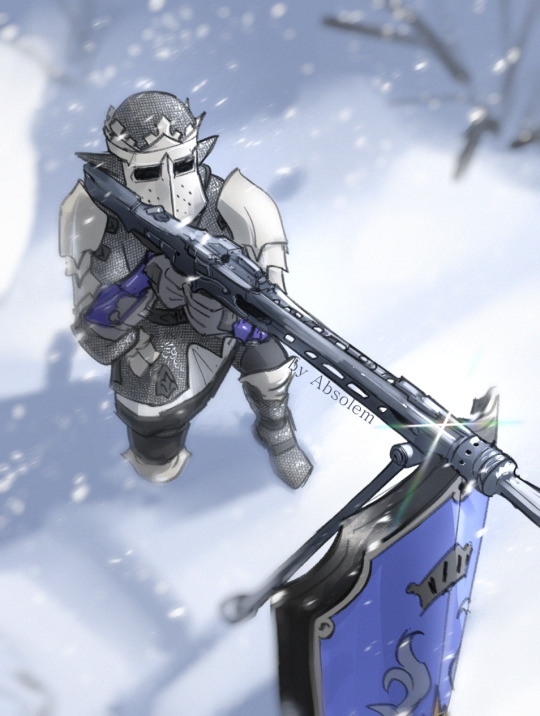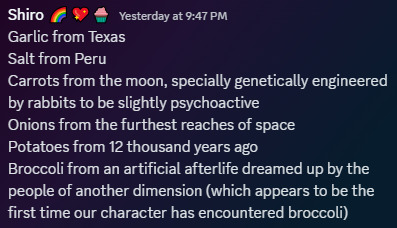This is my blog for my ffxiv character and everything game related
Don't wanna be here? Send us removal request.
Text

Day 7 of Apple Syrcus Week – Death and Rebirth
“From one Fandaniel to the next.”
91 notes
·
View notes
Text
i'm always in favor of adding more conditional dialogue to xiv, be it based on race or job or whatever else, but more than anything else i want fandaniel to have an extra line if you're wearing amon's hat. the more distressed he is about you having it, the better
1K notes
·
View notes
Text
do you think that the color white itself became unpopular on the First. bad luck attributed to white furred animals, white haired people. then their lord and savior Crystal Exarch begins to summon one white haired bitch after another
1K notes
·
View notes
Text






what we have went through
Prints // Twitter // Bsky // Goodshop
941 notes
·
View notes
Text




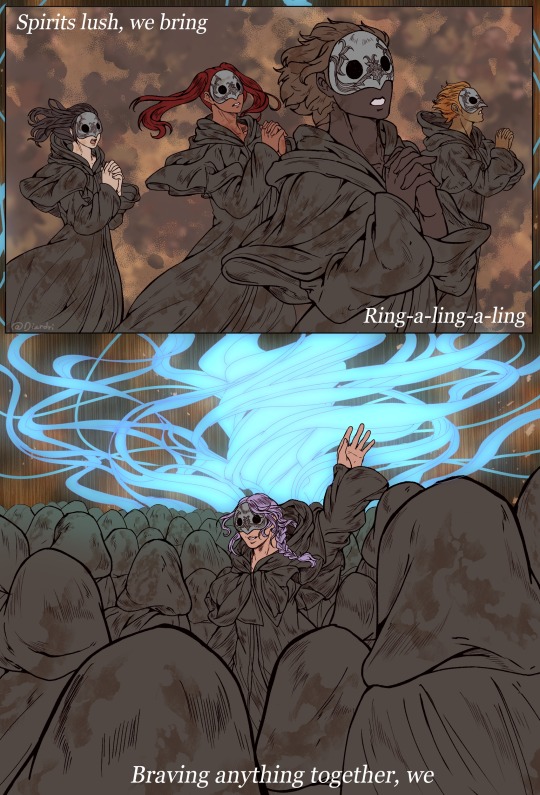
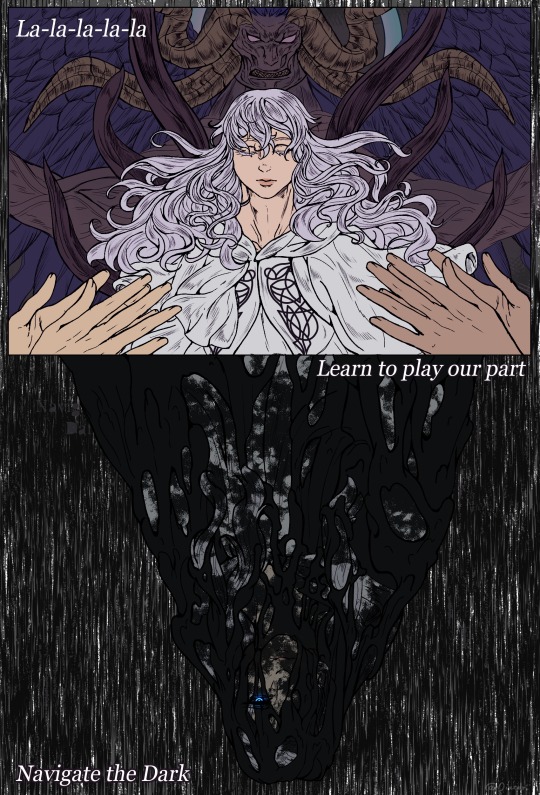
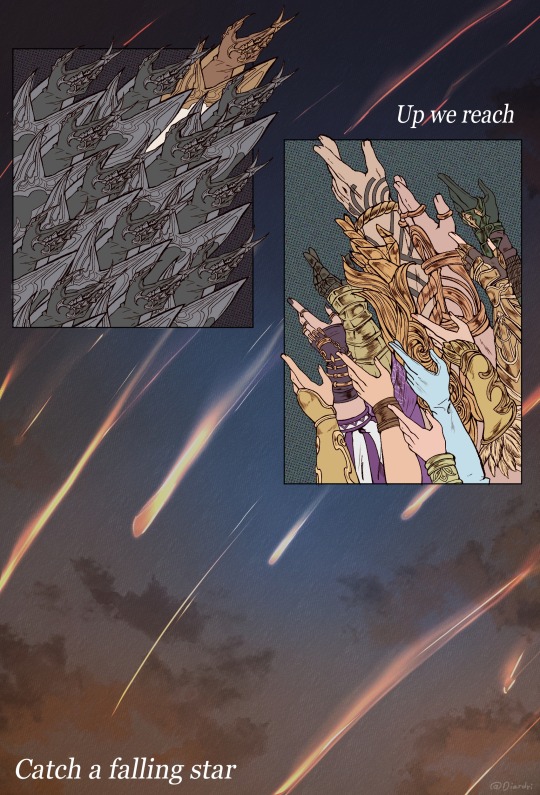

My tribute comic to the Ancients.
It didn't really come out as I would have liked but I'm glad I finished it.
The text is from the song "What Angel Wakes Me" from the Titania fight in ffxiv, written by Masayoshi Soken. Making this comic was only possible through the support of my patrons. If you enjoyed it and want to see more don't forget to ring that bell and smash the subscribe button consider giving me a follow and donating on kofi or subbing on patreon! Links are on my pinned post
1K notes
·
View notes
Text
Urianger coming to the First and seeing firsthand the effects of his actions upon this world is both a good thing and a terrible thing. It is, of course, a good thing that the First is saved. It is, obviously, a good thing that Minfilia traveling to the First managed to halt the Flood of Light before the entire star could be wiped out.
But for Urianger personally, seeing it firsthand is also a terrible thing, because it completely validates all of his most self-destructive impulses and affirms to him that everything he did to save the First was not only right but necessary. Everything he put himself and his loved ones through was necessary. Which means that if a similar situation arises, he'll have no choice (in his mind) but to do it all again. Which is exactly what happens! He's asked to be the deceiver again, and he sees no way out, and he dutifully puts on the costume again and plays the role he's been asked to play. He puts on the soothsayer's costume and plays the role of the prophet with a smile and words of wisdom, all while quietly dying inside and wishing he could actually tell the truth.
And that's the real bitter irony, I think, that the costume is, at the time, a lie--but he doesn't want it to be! The soothsayer is what he wants to be but not what he actually gets to be, not yet, because everything he's seen has only reinforced his belief that he has to be something else.
So he has to see that role fail before he can believe he's allowed to be anything else. The turning point of his character is not when he puts on the new costume, but when Exarch's plan fails. He is only able to become what he wants to be when what he has forced himself to be utterly crumbles around him, and he is forced to rebuild his sense of self out of those ruins. In this, the costume that was a lie eventually becomes true.
502 notes
·
View notes
Text

this will forever be the funniest moment in final fantasy xiv to me. you are a bright young officer of the globe-spanning evil empire. over the last few months you've watched the entire empire crumble from the edges inward after the former crown prince killed his father and seized the throne so he could redirect the state toward his own occult ends. you have witnessed unbelievable horrors. you had to kill your own family. finally, you get a chance to stand across from the man who caused all this and ask: why? what was it all for?
and he goes, uh, because i wanted to, dipshit? that's literally the only reason anyone does anything? fuck, you're stupid. if you don't believe me ask literally anyone else. or even like an alien. they'll tell you they do whatever they want for the specific reasons they made up. and like that's literally fine we're all just doing what we want for the cool made-up reasons we each picked.
then a teenager roasts him and he vanishes from history forever. you were probably the last of your countrymen to ever see or speak to him, the man who burned down everything you knew and loved for nothing at all. and like the second to last thing he ever said to you, right between imparting his existentialist philosophy and threatening to kill you, was that aliens are real. he didn't even pause, just said "go ask an alien" and went on with his speech like aliens existing was a baseline assumption everyone could agree on.
711 notes
·
View notes
Text


they're talking about the important things in r/ffxivdiscussion for a change
3K notes
·
View notes
Text
*tilting the camera around my wol, who is doing absolutely nothing of note and staring blankly ahead* omggg babyyyyyy you're so perfect I love you sooo muuuuuuch 🥺🥺🥺💞💓💖💝💕
2K notes
·
View notes
Text
Since my Azem Zoe's name means "life", I always wanted to make her transformation looks something like "tree of life"~

327 notes
·
View notes
Text
I find Y’shtola so interesting; I think she exemplifies some very fascinating dilemmas, but what’s unique about her is that they’re externalised as ways of seeing the world rather than internal emotional states. Her perspective is also a really important aspect of the story and the world.
The most fundamental thing about her is that she’s a scientist. It’s not just what she does, it’s who she is. It represents her strengths, her ambitions, her temperament, and the way she interacts with the world.
Unlike the other scions, she’s a scientist who grew up outside of Sharlayan’s academic structure, and is unbounded by its strictures and politics. She represents unbounded theoretical curiosity, independent of institutions and all their dampening considerations. It’s a beautiful, idealised vision of what science could be, if unbound by considerations like institutional approval and funding. It’s something Y’shtola learned in part from Matoya, who rejected the confines of Sharlayan academia and accomplished stupendous things in her cave.
I think this complements G’raha Tia, who represents an idealised vision of what academia could be: he explores the limits of what people can achieve together if they can throw aside clout-chasing, nepotism, petty politicking, biases, and the other things that cloud the idealism of academic institutions. G’raha is someone who fell in love with what Sharlayan represented, and came back to point out how they fell short of their own ideals. G’raha is someone who works to reform institutions; Y’shtola simply works independently of them, pushing the limits of what one person can accomplish.
Another very scientific characteristic of Y’shtola is her refusal to acknowledge limits: when she finds a thing that can’t be done, she hammers at it until it budges. She is convinced that there are answers to everything, and that science can find them. This is really something that’s fundamental to the scientific method: the idea that there’s always an answer to the question of ’why,’ and that that answer is something we can find and comprehend. What are atoms made of? Why are there only so many fundamental particles? Why do voidgates form? What is the fate of the universe? There is an answer, and she’ll find it. This is part of her initial clash with G’raha; she is insistent on the truth, and doesn’t like his keeping secrets.
She is also committed to seeing the science through, no matter what she’ll learn from it. She was ready to hear the Ea’s answer about the fate of the universe, no matter how terrible it was. And when she finds it, she’ll greet the unknown with delight; when she meets Zero, she looks the void in the face and smiles.
She’s also just a little remote, in the way of one who has spent too long staring into the heart of things. This doesn’t change the fact that she is a brave, steadfast, loyal companion to her friends, and a staunch champion of what’s right in the world. It’s something very personal; she sees things beyond the others’ sight, and her heart is preoccupied with things that are very removed from the considerations of everyday.
The Sharlayans’ performance of scientific objectivity is shown to be rooted in their very human prejudices, something that’s very true of institutional science in our world too. Y’shtola’s objectivity isn’t that sort of cold, inhumane objectivity; it isn’t a pretext for bigotry, or an abdication of responsibility. It’s something much more remote and whimsical, a commitment to a way of approaching things rather than a badge of superiority.
These are all, in a way, things that characterise the WoL, and I think they underlie the curious solidarity that builds between them post-Endwalker. The WoL, in a different way, is someone who doesn’t acknowledge the limitations of common sense, someone who looks truth in the face without flinching.
It’s also a delightful contrast, because the WoL is someone who repeatedly defies the limits of possibility, and that makes it even more interesting that they’re drawn together. Y’shtola is someone dancing at those very limits; the point where the preposterous becomes fact is where scientific discovery is born.
It’s also a very fun way of seeing science. Science as an institution is actually preoccupied with a kind of individualism - with the performance of individual merit, with the idea of the lone genius. (As we see in post-ARR, Alphinaud is misled by the accolades of the Studium to disastrous hubris.) Y’shtola might be fiercely independent, but she also isn’t that lone genius. She is utterly preoccupied with finding the answers, and not at all with any idea of personal success. The thing that lets her transcend her limits, the thing that lets her accomplish more than Matoya could, is friendship. When she works with the Scions, or Nidhana, or Zero, she can accomplish more than she ever could on her own.
I also think it’s very relevant that she’s a woman; in both our world and theirs, academia is largely male-dominated, and a lot of its flaws have to do with upholding that hegemony and not being open to more diverse perspectives. The ideal of the lone genius is overwhelmingly associated with men.
I think there’s something deeply idealistic and joyous about this unfettered spirit of scientific curiosity persisting through and after the events of Endwalker. We met the god of everything and defeated her in a duel; that doesn’t mean we know all the answers, or even all the questions. We cross paths with a far more technologically advanced civilisation, and Y’shtola is still able to have interesting scientific conversations with them. Even if many things about our world are arbitrary and uncaring, Y’shtola holds to her belief in the scientific method, and is still wholly, exuberantly committed to seeking out truths.
765 notes
·
View notes
Text

I can finally share my piece for ScionsZine! 🧡 + I also did a bonus version with my WoL.

1K notes
·
View notes
